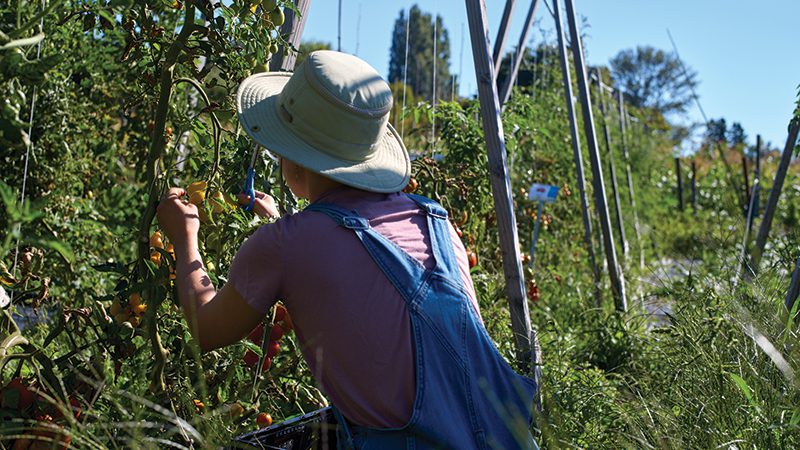Community Voices: A conversation with Solid Ground
This article was originally published in November 2022

PCC’s mission is to ensure that good food nourishes the communities it serves, while cultivating vibrant, local, organic food systems. We’re proud to partner with organizations throughout the region and share their stories. Sound Consumer contributor Tara Austen Weaver recently spoke with Kyle Kuhn, senior grant writer for Solid Ground, a long-established Seattle agency with a mission “to end poverty and undo racism and other oppressions that are root causes of poverty.” The organization started out as an emergency food bank, clothing bank and employment program; decades later its 22 different programs and services help some 67,000 households per year.
Q: How did Solid Ground get started?
A: We were originally founded as the Fremont Public Association in 1974—so we have 48 years of experience at the forefront of housing and homelessness prevention, as well as developing programs that nurture community-based skills and resources for participants throughout Seattle and King County. Our mission is to solve poverty and undo racism and the oppressions that contribute to it.
Q: Your mission is quite broad. Can you tell us about the scope of the work you do?
A: Solid Ground Transportation is where the largest part of our funding is—and that is in cooperation with King County Transit. We operate a lot of the Access busses, as well as the downtown commuter that goes between medical facilities to connect people and get them to their appointments. We also have advocacy efforts—our advocacy partner Statewide Poverty Action Network does a lot of great work advocating for policies. We have housing services, like Sand Point Housing and Broadview. We have a Domestic Violence shelter. We also have our community food education and stabilization services—we partner with the Seattle Food Committee to help with delivery to local food banks. Our stabilization services also include our housing stability project and two rapid rehousing programs. This has helped disperse rental assistance throughout the pandemic, which has been tremendously helpful to a lot of people. It’s easy to assume that Solid Ground is just housing, but it’s so much more. Very broadly, it’s human services.
Q: How has the pandemic impacted your programs and services?
A: Many of our case managers shifted their work to online spaces, but with our housing services people live there—so we have to pay attention to COVID numbers and King County guidance and continue to serve our participants the safest way we can. There’s been increased need, especially in areas like rental assistance, and we’ve had to make sure we weren’t cutting off access by going virtual. We’ve increased our technology support by providing broadband benefit access and hotspots and other equipment and technology needs. For some people it’s made access easier, if they have the technological abilities, but we still need to figure out that perfect mix to help people who still need in-person service aspects as well.
Q: There’s been an increase in food needs during the pandemic, can you tell us a little about your participation in Marra Farms, in south Seattle?
A: We’re part of the Marra Coalition—we maintain a pretty large plot there, along with other coalition members, and they do amazing work in the South Park community donating food to the Providence Regina House Food Bank and the South Park Senior Center. We have another project, in conjunction with SeaMar Health Clinics—they started something called the “Food Farmacia,” which provides free produce for their patients when they meet with their health educators as a way to make that connection between produce and nutrients to help them manage their health conditions.
Q: What do you wish more people understood about Solid Ground?
A: We’re more than just housing. We can help in other ways—anything from connecting people with resources to case management and housing search assistance. We have tenant services, which can help with landlord-tenant issues and education on renter laws in Washington State. I would recommend anyone who is experiencing hardship to reach out, because we do offer so many services. And if we can’t help, we pride ourselves in our partnerships and we will refer them to the organization that can meet their needs.
Q: What does the future look like for Solid Ground?
A: We continue to get the input of people who are actually experiencing poverty and homelessness—so often the people making very impactful decisions around homelessness have never experienced it. The need is always changing, so we will continue to adapt to meet these needs. Right now, that means helping the community continue to recover from COVID, as many people are still experiencing the economic effects of it.
Q: How can people get involved in helping or supporting your programs?
A: We recommend people check out the volunteer section of our website, if they find themselves with time they can donate—because time is very valuable. We do receive generous public funding for our programs, but private funding is invaluable because of the flexibility it allows us to adapt to client needs (government funding often comes with restrictions as to how it can be used). And you can check out our blog, which covers some of the measures we support that we believe will help people in our city.
Learn more
For more information visit solid-ground.org.
